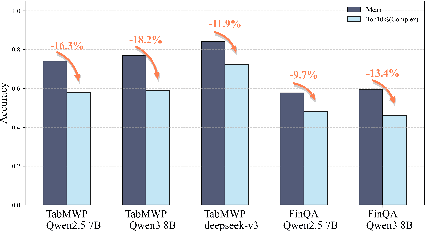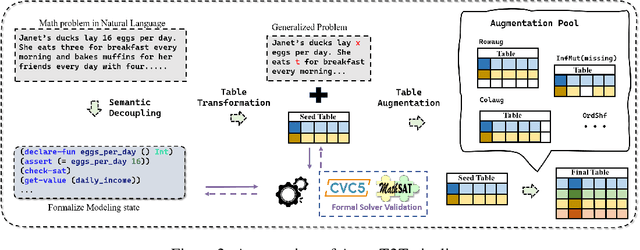Shi-Yu Tian
Automated Text-to-Table for Reasoning-Intensive Table QA: Pipeline Design and Benchmarking Insights
May 26, 2025



Abstract:Reasoning with tabular data holds increasing importance in modern applications, yet comprehensive evaluation methodologies for reasoning-intensive Table Question Answering (QA) tasks remain nascent. Existing research is constrained by two primary bottlenecks: 1) Reliance on costly manually annotated real-world data, which is difficult to cover complex reasoning scenarios; 2) The heterogeneity of table structures hinders systematic analysis of the intrinsic mechanisms behind the underperformance of LLMs, especially in reasoning-intensive tasks. To address these issues, we propose an automated generation pipeline AutoT2T that transforms mathematical word problems into table-based reasoning tasks, eliminating the need for manual annotation. The pipeline can generate multiple variants of a table for the same reasoning problem, including noisy versions to support robustness evaluation. Based on this, we construct a new benchmark TabularGSM, which systematically spans a range of table complexities and trap problems. Experimental analyses through AutoT2T and TabularGSM reveal that the tight coupling between reasoning and retrieval or identification processes is a key factor underlying the failure of LLMs in complex Table QA tasks. This highlights the necessity for models to develop synergistic reasoning capabilities in order to perform effectively in complex Table QA tasks.
LawGPT: Knowledge-Guided Data Generation and Its Application to Legal LLM
Feb 10, 2025



Abstract:Large language models (LLMs), both proprietary and open-source, have demonstrated remarkable capabilities across various natural language processing tasks. However, they face significant limitations in legal reasoning tasks. Proprietary models introduce data privacy risks and high inference costs, while open-source models underperform due to insufficient legal domain training data. To address these limitations, we study data generation for legal reasoning to improve the legal reasoning performance of open-source LLMs with the help of proprietary LLMs. This is challenging due to the lack of legal knowledge in proprietary LLMs and the difficulty in verifying the generated data. We propose KgDG, a knowledge-guided data generation framework for legal reasoning. Our framework enables leveraging legal knowledge to enhance generation diversity and introduces a refinement and verification process to ensure the quality of generated data. Moreover, we expand the generated dataset to further enhance the LLM reasoning capabilities. Using KgDG, we create a synthetic legal reasoning dataset containing 50K high-quality examples. Our trained model LawGPT outperforms existing legal-specific LLMs and achieves performance comparable to proprietary LLMs, demonstrating the effectiveness of KgDG and LawGPT. Our code and resources is publicly available at https://anonymous.4open.science/r/KgDG-45F5 .
Robustness Assessment of Mathematical Reasoning in the Presence of Missing and Contradictory Conditions
Jun 07, 2024Abstract:Large language models (LLMs) have demonstrated impressive performance on reasoning tasks, which can be further improved through few-shot prompting techniques. However, the current evaluation primarily focuses on carefully constructed benchmarks and neglects the consideration of real-world reasoning problems that present missing and contradictory conditions, known as ill-defined problems. Our observations suggest that existing few-shot prompting techniques are ineffective in such scenarios, often providing overconfident answers or hallucination. To further study this problem, we develop a benchmark called Problems with Missing and Contradictory conditions (PMC) and introduce two novel metrics to evaluate the performance of few-shot prompting methods in these scenarios. Our analysis using the PMC benchmark reveals a trade-off dilemma between the performance of mathematical reasoning for well-defined problems and the ability to recognize ill-defined problems. To address the challenges posed by PMC, we propose a novel few-shot prompting method called SMT-LIB Prompting (SLP), which utilizes the SMT-LIB language to model the problems instead of solving them directly. Subsequently, a double-check solving strategy checks the satisfiability and uniqueness of the solution and provides final feedback. Extensive experiments demonstrate the superiority of our SLP approach compared to existing few-shot prompting methods when dealing with problems with missing and contradictory conditions. We will open-source our benchmark and code to facilitate future research.
 Add to Chrome
Add to Chrome Add to Firefox
Add to Firefox Add to Edge
Add to Edge